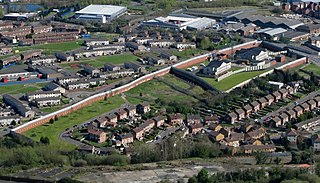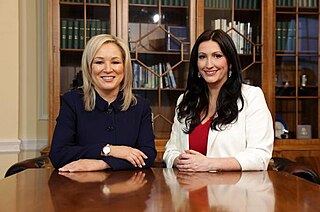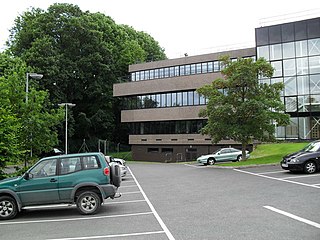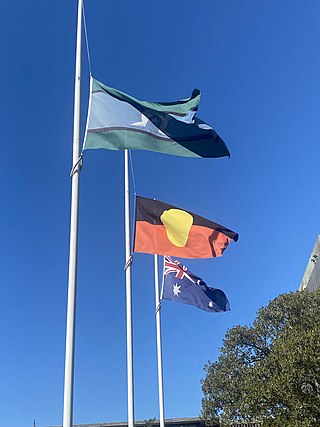Related Research Articles

This page gives an overview of the complex structure of environmental and cultural conservation in the United Kingdom.

John Hume was an Irish nationalist politician in Northern Ireland and a Nobel Peace Prize laureate. A founder and leader of the Social Democratic and Labour Party, Hume served in the Northern Ireland Parliament; the Northern Ireland Assembly including, in 1974, its first power-sharing executive; the European Parliament and the United Kingdom Parliament. Seeking an accommodation between Irish nationalism and Ulster unionism, and soliciting American support, he was both critical of British government policy in Northern Ireland and opposed to the republican embrace of "armed struggle". In their 1998 citation, the Norwegian Nobel Committee recognised Hume as an architect of the Good Friday Agreement. For himself, Hume wished to be remembered as having been, in his earlier years, a pioneer of the credit union movement.

The only official flag for Northern Ireland is the Union Flag or Union Jack, the flag of the United Kingdom; there is no official local flag that represents only Northern Ireland. The flying of various flags in Northern Ireland is a significant sectarian issue, with different communities identifying with different flags.

The Northern Ireland Assembly, often referred to by the metonym Stormont, is the devolved legislature of Northern Ireland. It has power to legislate in a wide range of areas that are not explicitly reserved to the Parliament of the United Kingdom, and to appoint the Northern Ireland Executive. It sits at Parliament Buildings at Stormont in Belfast.
The Northern Ireland Executive is the devolved government of Northern Ireland, an administrative branch of the legislature – the Northern Ireland Assembly, situated in Belfast. It is answerable to the assembly and was initially established according to the terms of the Northern Ireland Act 1998, which followed the Good Friday Agreement. The executive is referred to in the legislation as the Executive Committee of the assembly and is an example of consociationalist ("power-sharing") government.

Arts Council England is an arm's length non-departmental public body of the Department for Culture, Media and Sport. It is also a registered charity. It was formed in 1994 when the Arts Council of Great Britain was divided into three separate bodies for England, Scotland and Wales. The arts funding system in England underwent considerable reorganisation in 2002 when all of the regional arts boards were subsumed into Arts Council England and became regional offices of the national organisation.
Local government in Northern Ireland is divided among 11 single-tier districts known as 'Local Government Districts' and formerly known as district council areas (DCAs). Councils in Northern Ireland do not carry out the same range of functions as those in the rest of the United Kingdom; for example they have no responsibility for education, road-building or housing. Their functions include planning, waste and recycling services, leisure and community services, building control and local economic and cultural development. The collection of rates is handled centrally by the Land and Property Services agency of the Northern Ireland Executive.

The peace lines or peace walls are a series of separation barriers in Northern Ireland that separate predominantly Irish republican or nationalist Catholic neighbourhoods from predominantly British loyalist or unionist Protestant neighbourhoods. They have been built at urban interface areas in Belfast and elsewhere.

The Ministry of Housing, Communities and Local Government (MHCLG) is a ministerial department of the Government of the United Kingdom. It is responsible for housing, communities, and local government in England. It was established in May 2006 and is the successor to the Office of the Deputy Prime Minister, established in 2001. The department shares its headquarters building, at 2 Marsham Street in London, with the Home Office.

Since at least 1542, England and later Great Britain and Ireland have been connected politically, reaching a height in 1801 with the creation of the United Kingdom of Great Britain and Ireland. About five-sixths of the island of Ireland seceded from the United Kingdom in 1922 as the Irish Free State. Historically, relations between the two states have been influenced heavily by issues arising from their shared history, the independence of the Irish Free State and the governance of Northern Ireland. These include the partition of Ireland and the terms of Ireland's secession, its constitutional relationship with and obligations to the UK after independence, and the outbreak of political violence in Northern Ireland. Additionally, the high level of trade between the two states, their proximate geographic location, their common status as islands in the European Union until Britain's departure, common language and close cultural and personal links mean political developments in both states often closely follow each other.

The First Minister and deputy First Minister of Northern Ireland are the joint heads of government of Northern Ireland, leading the Northern Ireland Executive and with overall responsibility for the running of the Executive Office. Despite the titles of the two offices, the two positions have the same governmental power, resulting in a duumvirate; the deputy first minister is not subordinate to the first minister. Created under the terms of the 1998 Good Friday Agreement, both were initially nominated and appointed by members of the Northern Ireland Assembly on a joint ticket by a cross-community vote, under consociational principles. That process was changed following the 2006 St Andrews Agreement, such that the first minister now is nominated by the largest party overall, and the deputy first minister is nominated by the largest party from the next largest community block.

The Good Friday Agreement (GFA) or Belfast Agreement is a pair of agreements signed on 10 April 1998 that ended most of the violence of the Troubles, an ethno-nationalist conflict in Northern Ireland since the late 1960s. It was a major development in the Northern Ireland peace process of the 1990s. It is made up of the Multi-Party Agreement between most of Northern Ireland's political parties, and the British–Irish Agreement between the British and Irish governments. Northern Ireland's present devolved system of government is based on the agreement.

The Department of Justice is a government department in the Northern Ireland Executive, which was established on 12 April 2010 as part of the devolution of justice matters to the Northern Ireland Assembly. The department's Permanent Secretary is Hugh Widdis. It combines the previous work of the Northern Ireland Office and the Ministry of Justice, within the United Kingdom Government, which were respectively responsible for justice policy and the administration of courts in Northern Ireland.
Co-operation Ireland is a non-political and non-denominational charity dedicated to peace and reconciliation in Northern Ireland and the Republic of Ireland. Much of Co-operation Ireland's work focuses on bringing the two main communities in Northern Ireland together through programmes such as the Civic-Link programme.

In the United Kingdom, devolution is the Parliament of the United Kingdom's statutory granting of a greater level of self-government to the Scottish Parliament, the Senedd, the Northern Ireland Assembly and the London Assembly and to their associated executive bodies: the Scottish Government, the Welsh Government, the Northern Ireland Executive and in England, the Greater London Authority and combined authorities.
In the United Kingdom, intergovernmental relations refers to the relationship, cooperation, and engagement between the UK Government and the Scottish Government, Welsh Government and Northern Ireland Executive.
Reconciliation theology in Northern Ireland is a contextual process and a divine goal which involves working to create freedom and peace in Northern Ireland. As with reconciliation theology more widely, reconciliation theology in Northern Ireland emphasises the concepts of truth, justice, forgiveness, and repentance. A theology of reconciliation is practically applied by reconciliation communities.

Reconciliation in Australia is a process which officially began in 1991, focused on the improvement of relations between the Aboriginal and Torres Strait Islander peoples of Australia and the rest of the population. The Council for Aboriginal Reconciliation (CAR), created by the government for a term of ten years, laid the foundations for the process, and created the peak body for implementation of reconciliation as a government policy, Reconciliation Australia, in 2001.
The East–West Council was established in 2024 as part of the Northern Ireland Executive reformation with a purpose to improve links between Northern Ireland and rest of the United Kingdom.
References
- ↑ Community Relations Council. "About Us". Community Relations Council. Community Relations Council. Retrieved 10 July 2024.
The Northern Ireland Community Relations Council was established in 1990 to lead and support change towards reconciliation, tolerance and mutual trust. CRC is an Arm's Length Body of The Executive Office (TEO), a Department of the Northern Ireland Executive, and a catalyst for good inter-community and inter-cultural community relations work in the region.
- ↑ The Executive Office. "Community Relations Council". The Executive Office. The Executive Office. Retrieved 10 July 2024.
The Community Relations Council (CRC) is a key delivery partner for The Executive Office good relations policy, including the implementation of the aims and objectives of the Together: Building a United Community (T:BUC) Strategy.